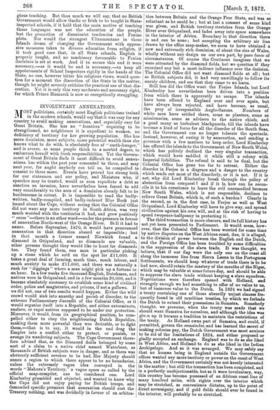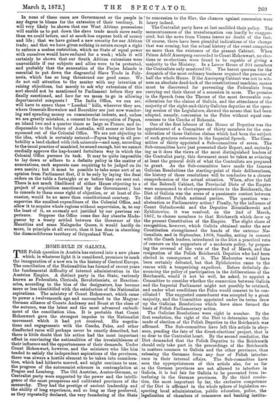INVOLUNTARY ANNEXATIONS. tion between Britain and the Orange Free State,
and was as reluctant as he could be ; but at last a consent of some kind was given, and British territory stretches from the Orange River over Griqualand, and fades away into space somewhere in the interior of Africa. Boundary in that direction there is and can be none ; but accepting the arbitrary air line drawn by the office map-maker, we seem to have obtained a new and extremely rich dominion, of about the size of Wales, wholly without any design on our own part, by pure force of circumstances. Of course the Continent imagines that we were attracted by the diamond fields, but we question if they exercised any but a most indirect influence over the decision. The Colonial Office did not want diamond fields at all ; but as British subjects did, it had very unwillingly to follow its unruly children, and see that they came to no harm.
Still less did the Office want the Feejee Islands, but Lord Kimberley has nevertheless been driven into a position from which there is apparently no escape. The islands have been offered to England over and over again, but have always been rejected, and have become, as usual, the prey of irresponsible Anglo-Saxons. Numbers of white men have settled there, some as planters, some as missionaries, some as advisers to the native chiefs, and a good many as turbulent blackguards, till the islands have become a kind of focus for all the disorder of the South Seas, and the Government can no longer tolerate the spectacle. Instead, however, of curing it by annexation, and sending a governor with a few marines to keep order, Lord Kimberley has offered the islands to the Government of New South Wales, which has politely declined the very singular transaction, which would have saddled it while still a colony with Imperial liabilities. The refusal is said to be final, but the Colonial Office has gone too far to retreat. Either the disorder in Feejee is a disgrace and a danger to the country which sends out most of the disorderly, or it is not. If it is not, why did Lord Kimberley break through the policy of abstention from conquest ? and if it is, how can he recon- cile it to his conscience to leave the evil unremedied because New South Wales, which is not responsible, declines to relieve Great Britain, which is, of such a burden Clearly in the second, as in the first case, in Feejee as well as West Griqualand, Lord Kimberley will have to give way, and spread civilization against his own will, and at the risk of having to spend twopence-halfpenny in protecting it.
The third transaction is more obscure, and its full history has not yet been presented to Parliament. It would seem, how- ever, that the Colonial Office has been worried for some time " by native disputes on the West African coast, due, it is alleged, to the division of power between the English and the Dutch, and the Foreign Office has been troubled by some difficulties in the suppression of the slave trade. It was thought, we believe, that if our flag were the only one on the coast all along the immense line from Sierra Leone to the Portuguese Settlements, we should keep whatever of trade there is to be had now, should retain the mastery of the mouths of the Niger, which may be valuable at some future day, and should be able to suppress the slave trade without keeping a slave squadron. Negotiations were therefore opened with Holland, and strangely enough we had something to offer of no value to us, but of immense value to the Dutch. In 1824 we had signed a treaty containing one of those absurdly unjust clauses fre-
quently found in old maritime treaties, by which we forbade the Dutch to extend their possessions in Sumatra. Somebody thought, we presume, when the treaty was made that we should want Sumatra for ourselves, and although the idea was given up it became a tradition to maintain the restrictions of the treaty. As Holland owns part of Sumatra, and could, if permitted, govern the remainder, and has learned the secret of
making colonies pay, the Dutch Government was most anxious to be rid of the limitations of 1824, and either proposed or gladly accepted an exchange. England was to do as she liked in West Africa, and Holland to do as she liked in the Indian Archipelago. And so it was arranged. We may safely say that no human being in England outside the Government offices wanted any more territory or power on the coast of West Africa, and the Government certainly was not keenly interested in the matter ; but still the transaction has been completed, and in a perfectly unobjectionable, but as it were involuntary, way, this country has become possessed of an African coast line of many hundred miles, with rights over the interior which may be stretched, as convenience dictates, up to the point of direct sovereignty, and if gold fields should ever be found in the interior, will probably be so stretched. In none of these cases are Government or the people in any degree to blame for the extension of their territory. It will very likely be shown that our West African possessions will enable us to put down the slave trade much more easily than we could before, and at much less expense both of money and life ; that we have gained a new security for our African trade; and that we have given nothing in return except a right to enforce a useless restriction, which no State of equal power with ourselves would have endured for a week ; while it will certainly be shown that our South African extensions were unavoidable if our subjects and allies were to be protected, and probably that the annexation of the Feejee Islands is essential to put down the disgraceful Slave Trade in Poly- nesia, which has so long threatened our good name. We do not call attention to the matter with any intention of raising objections, but merely to ask why extensions of this sort should not be mentioned to Parliament before they are finally sanctioned, and how far we mean to go in allowing departmental conquests ? The India Office, we can see, will have to annex those " Looshai " hills, wherever they are, where Generals Brownlow and Bourchier are just now wander- ing and spending money on commissariat indents, and, unless we are greatly mistaken, a consent to the occupation of Papua, an island two and a quarter times as large as France, and in- dispensable to the future of Australia, will sooner or later be squeezed out of the Colonial Office. We are not objecting to the idea, which is certainly natural—Papua being in all pro- bability a land choked with rich minerals—and may, according to the usual practice of mankind, be sound enough, but we cannot cordially approve the hap-hazard fortuitous way in which the Colonial Office pursues its task. It may be quite impossible to lay down or adhere to a definite policy in the matter of annexations, each separate case requiring to be judged on its own merits ; but it must be possible to take some sort of an opinion from Parliament first, if it be only by laying the final orders on the table a fortnight or so before they are sent out. There is not much likelihood of either House objecting to a project of acquisition sanctioned by the Government ; but to concede to them some right of objection, or at least of dis- cussion, would be no more than constitutional courtesy. To supervise the smallest expenditure of the Colonial Office, and allow it to acquire whole regions without supervision, is, to say the least of it, an anomaly not justified by our previous ex- perience. Suppose the Office some fine day absorbs Mada- gascar by a treaty settled between the Governor of the Mauritius and some Malagache Queen, it would hardly do more, in principle at all events, than it has done in absorbing the diamondiferous territory of Griqualand West.



































 Previous page
Previous page